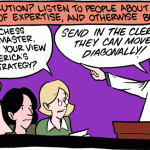PNAS
A few random items on expertise, elitism and credibility.
The first is from an interview with the late Stphen Schneider about the recent PNAS paper on the relative expertise of "convinced" and "unconvinced" climate science activists, an interesting read:
About the 'elitist' part: Scientists are really stuck. It's exactly the same thing in medicine, it's the same thing with pilot's licenses and driver's licenses: We don't let just anyone go out there and make any claim that they're an expert, do anything they want, without checking their credibility. Is it elitist to license pilots and doctors…
A muskox (Ovibos moschatus), photographed in Alaska. From Flickr user drurydrama.
Of all the mass extinctions that have occurred during earth's history, among the most hotly debated is the one which wiped out mammoths, saber-toothed cats, giant ground sloths, and the other peculiar members of the Pleistocene megafauna around 12,000 years ago. It was not the most severe mass extinction, not by a long shot, but unlike the end-Cretaceous catastrophe 65 million years ago there is no single "smoking gun" that can account for the pattern of extinction. Instead the Pleistocene mass extinction…
It has long been known that ants recognize their deceased nestmates using the smell of fatty acids that accumulate as the body decomposes. The chemical signature of deadness helps ants remove the corpses from their midst, keeping a clean and sanitary nest. Indeed, this classic tale of ants and oleic acid is one of E. O. Wilson's favorite stories.
But it turns out that the story is even richer than previously supposed. A study by Dong-Hwan Choe et al published in yesterday's PNAS note that Argentine ants (Linepithema humile) carry away the dead even before the fatty acids appear…
We all know Twitter can be annoying, but is it really evil? During the past week, you may have heard that there is brand-new neuroscientific evidence proving exactly that. But the hype turns out to be just that: hype.
It all started with a press release from USC about an upcoming PNAS paper by Mary Helen Immordino-Yang and Antonio Damasio, entitled "Neural Correlates of Admiration and Compassion." The USC press release, which was picked up by EurekAlert and other outlets, says:
The finding, contained in one of the first brain studies of inspirational emotions in a field dominated by a focus…
